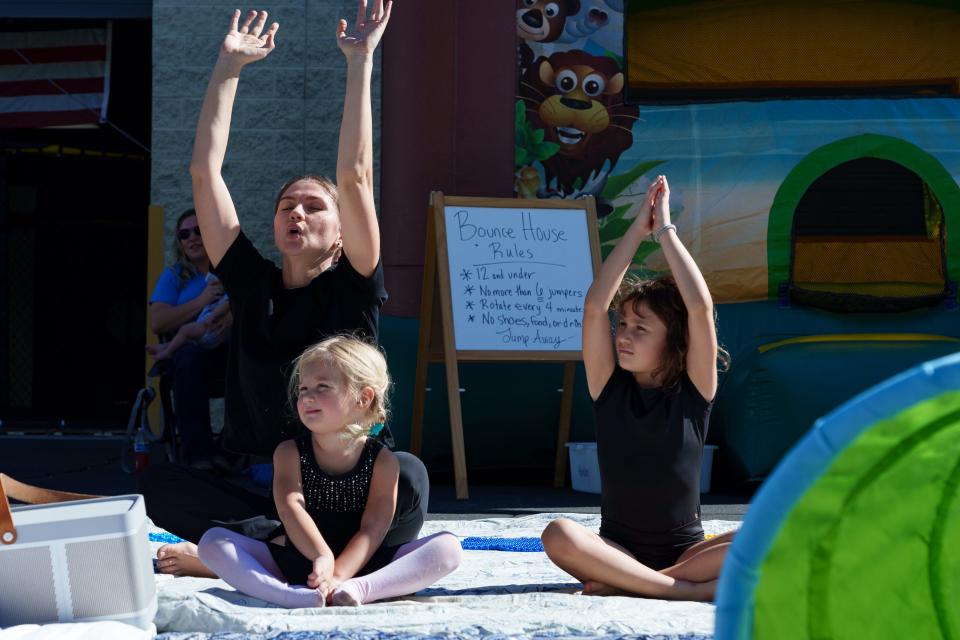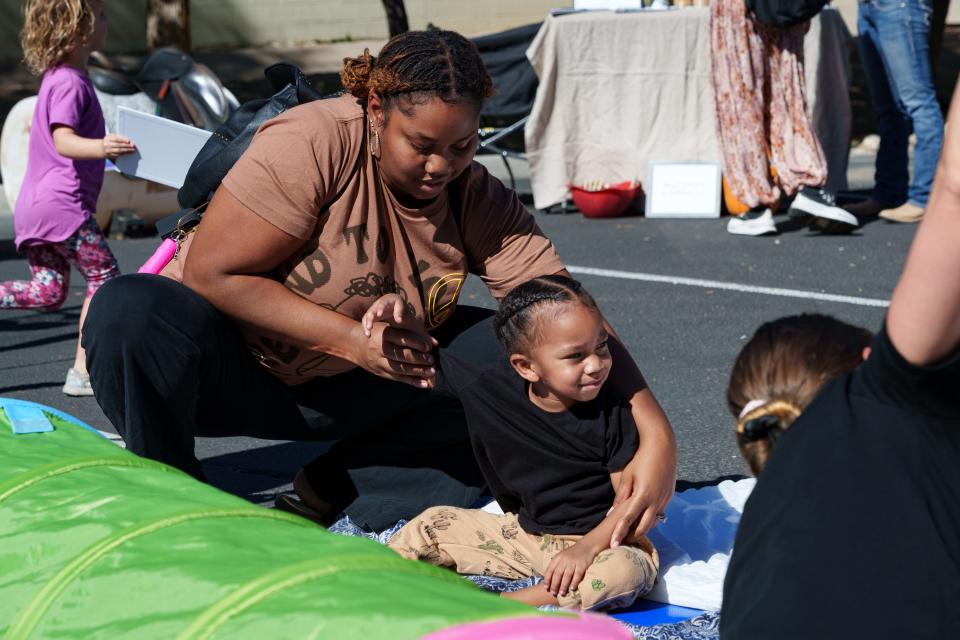Arizona businesses hope to capitalize on school voucher expansion. Here's how
After Glen Baker’s last professional MMA fight in 2018, he decided to capitalize on his following in the northwest Valley.
Now, he teaches kickboxing, jiujitsu, wrestling and full MMA to nearly 200 students at Baker's MMA & Fitness, which he opened in Surprise in 2019.
He said that about 20 students pay for his classes through Arizona’s Empowerment Scholarship Account program, which allows kids in Arizona to use state money for educational expenses like private school tuition, supplies and tutoring.
On Oct. 28, Baker opened his doors to host a fair of more than a dozen other vendors of the ESA program so they could market their businesses to West Valley parents.
About a year into the universal expansion of school vouchers in Arizona, parents are still exploring ways to personalize their children’s education with state money. There are now more than 69,500 students in the program, according to the most recent Department of Education data. Before the expansion, the funding was only available to select groups, including students with disabilities or children who have a parent in the military.
The school voucher program's rapid expansion, up from roughly 12,000 students at the end of the 2021-22 school year, has drawn criticism and alarm from public education advocates, as well as Gov. Katie Hobbs, who in October called it “unaccountable and unsustainable.” Little data is collected on the use of school vouchers in the state.
The typical voucher amount for the 2022-23 school year was between $6,000 and $9,000 for 1st through 12th grade students without disabilities and between $4,000 and $5,000 for kindergarten students without disabilities, according to the Department of Education. In general, students with disabilities are eligible for larger voucher amounts.

School voucher vendors advertise to parents: Former MMA fighter, microschool company, school psychologist
For vendors that accept ESA dollars, the market is still evolving.
The fair’s organizer, Chris Holmberg, started ESA Connection to act as a go-between. The company's website is intended to be a space for parents to find vendors — as well as review them — and for vendors to market their services.
Though Holmberg started the company in 2022, the website launched this fall. He plans to organize more vendor fairs across the Valley.
He wants to increase the level of confidence parents have about engaging in private education. In his view, Arizona's relative lack of school voucher program regulation puts the onus on parents to assess vendors and make the right decisions for their children.
“I just think the way that Arizona’s done it is going to allow innovation very, very fast,” Holmberg said.
The fair featured vendors who provide equine activities, books and curriculum, music lessons and arts and crafts activities. Some were new to the ESA program, while others had accepted ESA vouchers before its universal expansion.
Baker, of Baker’s MMA, said parents who enroll their kids in his classes want to instill discipline. His students who use ESA funding mostly take private lessons during the day, which cost $60 per hour, he said.
“Martial arts saved my life,” Baker said. “It got rid of my anger. It taught me how to get that outlet” and how to clear his mind, he said. These are things he wants to instill in kids from an early age, he said.
Stephen Neal, a school psychologist at a charter school network, recently began offering services through the ESA program. In addition to his day job, he provides consultations to families regarding ways they can accommodate their child’s special education needs. He said he was looking to provide counseling as well.

Clayton Cone was there to advertise Prenda, a company that helps parents and educators start microschools, which are small, private learning environments. Since it began in 2018, Prenda has helped launch roughly a thousand microschools, mainly in Arizona, Cone said.
While microschools typically have 10 to 12 students or fewer, they must, at a minimum, include at least two students from different homes, Cone said. Prenda runs a background check on teachers of the microschools it helps launch. The company accepts ESA funding for its yearly fees, which include access to curriculum, coaching for teachers, invoicing services and software to provide benchmark testing. The annual fees per student are $1,499 for kindergarten and $2,199 for grades 1-8.
Cone said that most microschools Prenda works with operate within someone’s home. The model is “low-hanging fruit” for parents who are already homeschooling their child and want to include more kids, and it also attracts former educators who want to teach in a smaller learning environment that’s more flexible, he said.
Homeschool parents eagerly seek resources
For the parents in attendance, the fair was a way to learn about some of the resources available to their kids. Parents at the fair pulled their kids from the public school system for a variety of reasons.
Brandy Welch said that two of her children, ages 8 and 9, were struggling to learn to read at school. After teaching them over the summer using Hooked on Phonics, which she used as a kid, and another free curriculum that she found on TikTok, she said she noticed that they were “soaring.” She decided to keep them home this school year and was at the fair to look for resources and learn how to apply for the ESA program.
Viviana Selander wanted her two school-aged children, ages 5 and 7, to learn a Christian faith-based curriculum in a homeschool environment. She also wanted them to focus their education on nature — she said they travel to Sedona at least once a month.
“They learn as they’re going through the creeks, as they’re hiking,” Selander said. “Every opportunity that you have to expand their knowledge, expand their questioning, is what we like to do." She said she believes that is not necessarily possible in a school environment. At the fair, she sought resources to strengthen her kids’ faith and “core values.”
For Kimberly Campbell, the bullying her 12-year-old daughter experienced at school was the tipping point. She said she never wanted to homeschool her kids, who had been in public schools all their lives. But that changed after her family moved to Arizona for her husband’s job in the military, and she felt her daughter’s school was unable to address the bullying she was experiencing.
Cherie Neal wasn’t happy with the special education services available to her daughter, who received her first individualized education plan in 6th grade and was placed in a self-contained special education classroom. She pulled her now 14-year-old daughter from public school and enrolled her in two virtual learning platforms through the ESA program — one for her core classes, as well as Bible and language classes, and another that provides online cooking classes. Cherie Neal was at the ESA vendor fair with her husband, Stephen Neal, the charter network school psychologist.
Cherie Neal used ESA funding to pay for her daughter to go through a six-month, at-home dog training program taught by a trainer who previously worked at Petco and now owns his own business. Now, Cherie Neal is looking to find out if her daughter could get hands-on classes from a nail technician, a welder or a veterinarian through the ESA program.
"These should be programs that our children have access to that they can have more hands-on" experience, she said. "Especially ones that aren't going to be looking at maybe a full-time college."
Madeleine Parrish covers K-12 education. Reach her at mparrish@arizonarepublic.com and follow her on X, formerly known as Twitter: @maddieparrish61.
This article originally appeared on Arizona Republic: Arizona businesses hope to capitalize on school voucher expansion

